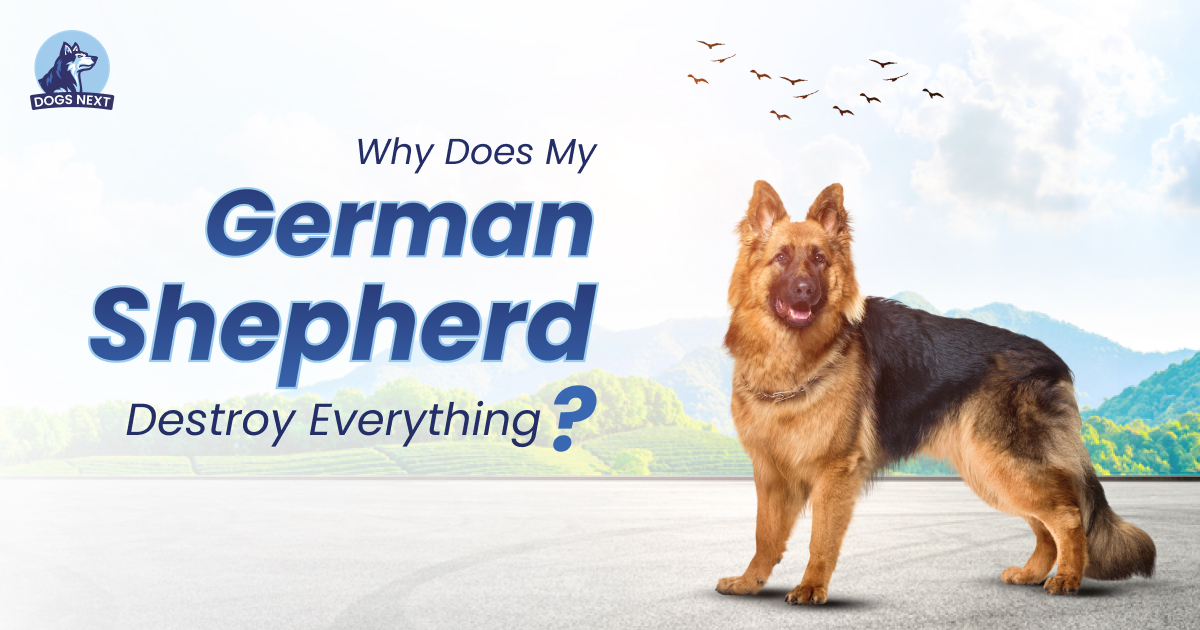German Shepherds are one of the most intelligent and loyal dog breeds, known for their strong work ethic and protective instincts. However, many owners of German Shepherds often face the challenge of managing their destructive behavior. If you’re one of those owners wondering, “Why does my German Shepherd destroy everything?”, then you’re in the right place.
There could be several reasons why your German Shepherd is destructive. Some possible explanations include Lack of Exercise, Separation Anxiety, Teething, Lack of Training, Medical Issues, etc.
In this article, we’ll explore the underlying causes of destructive behavior in German Shepherds and offer practical tips for managing it. Whether you’re a new or experienced German Shepherd owner, this article will provide valuable insights into this common problem.
8 Common Reasons Why German Shepherds Destroy Things
German Shepherds are intelligent, loyal, and energetic dogs that require a lot of attention and exercise. Unfortunately, their high energy levels and instincts can lead to destructive behavior such as chewing, digging, and scratching.
If you’re a German Shepherd owner who is frustrated with their destructive behavior, it’s essential to understand the underlying reasons why they’re doing it.
The table below outlines eight common reasons why German Shepherds destroy things, along with their causes and solutions:
| Reason | Cause | Solution |
| Boredom | Lack of exercise and mental stimulation | Provide daily exercise, playtime, and mental stimulation such as puzzle toys and interactive games |
| Separation anxiety | Fear and stress when left alone | Gradually get your German Shepherd used to being alone, provide mental stimulation while you’re away, or seek professional help |
| Teething | Natural process of puppy development | Provide appropriate chew toys and redirect them when they chew on inappropriate items |
| Lack of training | Inappropriate behavior due to lack of training | Provide regular training sessions and use positive reinforcement techniques |
| Fear and anxiety | Fearful or anxious situations | Address the root cause of fear or anxiety, seek professional help if necessary |
| Attention seeking | Lack of attention or socialization | Provide regular attention, playtime, and socialization with other dogs and people |
| Health issues | Underlying health conditions | Address any underlying health issues and provide appropriate medical treatment |
| Prey drive | Natural instinct to hunt and chase | Redirect prey drive with appropriate training and provide plenty of exercises. |
Understanding the Behavior of a German Shepherd
However, like any dog, German Shepherds can exhibit destructive behavior if not managed properly. Understanding their instincts and behavior can go a long way in preventing destructive behavior.
Some key things to keep in mind when it comes to understanding the behavior of a German Shepherd include:
- German Shepherds are highly intelligent dogs that require plenty of mental stimulation and training.
- They have a strong prey drive and may be prone to chasing and even attacking smaller animals.
- German Shepherds are highly protective of their owners and may become aggressive towards strangers if not socialized properly.
- Separation anxiety is a common issue in German Shepherds, and they may become destructive when left alone for extended periods.
Tips for Managing Destructive Behavior in German Shepherds
If your German Shepherd is exhibiting destructive behavior, there are several things you can do to manage it. Here are some tips to help:
Provide plenty of exercises and mental stimulation
German Shepherds require a lot of exercise and mental stimulation to stay healthy and happy. Make sure your dog is getting enough daily exercise and provide them with puzzle toys and other forms of mental stimulation.
Supervise your German Shepherd
When you’re not home, keep your German Shepherd in a secure area such as a crate or a room with plenty of toys and activities to keep them entertained.
Use positive reinforcement training techniques
Positive reinforcement training is an effective way to train your German Shepherd and can help manage destructive behavior. Reward good behavior with treats, praise, and attention.
Provide appropriate chew toys
German Shepherds have a natural urge to chew, so provide them with appropriate chew toys to satisfy their need to chew and prevent destructive chewing behavior.
Consider professional training
If your German Shepherd’s destructive behavior is causing significant problems, consider seeking the help of a professional dog trainer who has experience with German Shepherds. They can help address underlying behavioral issues and provide you with effective training techniques.
Preventing Destructive Behavior in German Shepherds
Preventing destructive behavior in German Shepherds requires a combination of management and training techniques. Here are some tips to help prevent destructive behavior in your German Shepherd:
Manage their environment
When you’re not able to supervise your German Shepherd, restrict their access to areas where they are prone to destructive behavior. Consider using baby gates or closing doors to prevent them from entering certain rooms.
Provide appropriate chew toys
German Shepherds have a strong urge to chew, so provide them with plenty of safe and appropriate chew toys to satisfy their needs. Avoid giving them items such as shoes, furniture, or other household items to chew on.
Increase exercise and mental stimulation
German Shepherds require plenty of exercises and mental stimulation to keep them happy and healthy. Make sure they get enough physical activity, playtime, and mental stimulation to reduce their boredom and stress levels.
Crate train your German Shepherd
Crate training can be an effective way to prevent destructive behavior while you’re away from home. It gives your German Shepherd a safe and secure space to rest and reduces the risk of destructive behavior.
Use positive reinforcement training
Positive reinforcement training is a highly effective way to teach your German Shepherd appropriate behavior. Reward good behavior with treats, praise, and playtime to encourage them to continue behaving well.
How to Stop Your German Shepherd’s Destruction
Stopping destructive behavior in German Shepherds requires a combination of training, management, and patience. Here are some tips to help stop destructive behavior in your German Shepherd:
Identify the root cause
Identifying the underlying cause of your German Shepherd’s destructive behavior is essential to addressing the problem. It could be due to boredom, anxiety, or lack of training.
Increase exercise and mental stimulation
German Shepherds need plenty of exercises and mental stimulation to keep them happy and healthy. Increase the frequency and intensity of their exercise routine and provide them with plenty of mental stimulation to reduce their boredom and stress levels.
Use positive reinforcement training
Positive reinforcement training is a highly effective way to teach your German Shepherd appropriate behavior. Reward good behavior with treats, praise, and playtime to encourage them to continue behaving well.
Provide appropriate chew toys
German Shepherds have a strong urge to chew, so provide them with plenty of safe and appropriate chew toys to satisfy their needs. Avoid giving them items such as shoes, furniture, or other household items to chew on.
Consider seeking professional help
If your German Shepherd’s destructive behavior is severe or persistent, consider seeking the help of a professional dog trainer. They can help identify the root cause of the behavior and provide you with tailored training and management techniques to address it.
Frequently Asked Questions
Q: Are German Shepherds destructive when bored?
Ans: Yes, German Shepherds can become destructive when bored, as they have a high level of energy and intelligence that needs to be channeled appropriately.
Q: What age do German Shepherds stop chewing things?
Ans: The age at which German Shepherds stop chewing things can vary, but it is typically around 6 to 8 months of age when their adult teeth start coming in and their chewing behavior reduces.
Q: What are the faults of German Shepherds?
Ans: German Shepherds, like any other breed, have their faults. Some of the common faults include aggression, hip dysplasia, digestive problems, and separation anxiety.
Q: Do German Shepherds have anger issues?
Ans: German Shepherds can display aggressive behavior if they are not trained and socialized properly. However, it is not accurate to say that they have anger issues as it is a human emotion and dogs do not have the same complex emotional range as humans.
Conclusion
In conclusion, understanding the reasons why your German Shepherd is destroying everything is the first step towards managing their behavior. By providing your furry friend with sufficient exercise, mental stimulation, and professional training, you can prevent destructive behavior and build a stronger bond with your pet.
Remember, boredom, separation anxiety, and instincts are some of the most common factors that contribute to destructive behavior in German Shepherds. By addressing these factors, you can help your German Shepherd lead a happy and fulfilling life without resorting to destructive behavior.
So, the next time you ask yourself, “Why does my German Shepherd destroy everything,” remember that with patience, care, and the right approach, you can effectively manage your dog’s behavior and enjoy a happy life together.

I’m David, an expert contributor and writer, with two furry friends of my own, I know the challenges of raising and caring for dogs. From training to nutrition and health, my goal is to provide valuable insights and advice to help create strong bonds and happy, healthy lives. Find me in Twitter.




